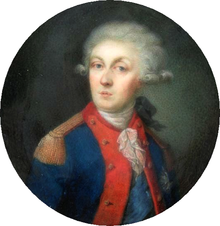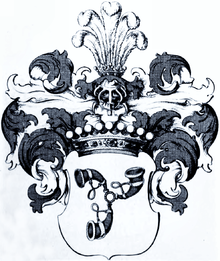Eduard von Woyna
Eduard Graf von Woyna (* 13. March 1795 in Vienna , † 1. January 1850 in Brussels ) was a kk Real Chamberlain (1813) and Secret Council , Field Marshal Lieutenant and diplomat , envoy extraordinary and minister plenipotentiary at the Swedish, Russian and Belgian court.
Origin and family
Eduard came from an old, respected Polish noble family, which was already in great esteem at the end of the 15th and beginning of the 16th century and belonged to the well-known Tromby I family.
Woyna was the youngest son of Franz Xaver (* 1750 in Warsaw , † May 15, 1813 in Vienna). His father was a Polish officer, was appointed major general and deputy director of the Warsaw Cadet Corps, and in 1793 was appointed lieutenant general. Under Austrian rule, he became the Privy Councilor and President of the Land Law in Cracow and, from November 1797, Vice Chancellor of the Galician Court Chancellery in Vienna. He was married to Maria Theresa, née Countess Czaplików, also Czablick, (1768–1835). His siblings were Felix (born March 25, 1788 in Milan , † October 27, 1857 in Verona ), who had also risen to become field marshal lieutenant , Moriz (born September 16, 1788 in Milan), Colonel in the 4th Uhlan Regiment, and Sophie (* May 7, 1790). The latter was an Imperial and Royal Star Cross - and lady-in-waiting of Archduchess Maria Elisabeth , wife of Archduke Rainer . In 1800, Emperor Franz II elevated the family to the status of Austrian count.
With his son Moriz (born July 11, 1841), who had also embarked on a military career and was an officer in an imperial cavalry regiment, the Austrian branch of this sex in the male line went out in the early 1970s.
biography
Woyna entered the war service very early on, and after the campaign of 1812 , in which his regiment was with the active auxiliary corps of Prince Schwarzenberg , the Prince pulled him to his headquarters and until 1815 put him mainly to do his correspondence in foreign languages. He distinguished himself for the first time as Rittmeister in the Kaiser-Uhlan Regiment No. 4 in the campaign of 1814 and received, in addition to the Army Cross, the Imperial Russian Order of St. Vladimir 4th Class .
In 1817 the officer switched to a diplomatic career and was assigned to the embassy of Count Karl Ludwig von Ficquelmont . When the latter was later appointed ambassador to Saint Petersburg , Woyna, who was still very young, followed him as chargé d'affaires to the legation post at the royal Swedish court in Stockholm (from May 26, 1820 to November 12, 1829). In this office he was decorated with the Knight's Cross of the Royal Swedish Order of the Sword 1st Class on October 6, 1822 and promoted to the rank of major of the Saxe-Coburg-Gotha-Uhlan Regiment No. 1 in July 1827 . On November 13, 1829 he was promoted to extraordinary envoy and plenipotentiary minister, a function which he held until July 12, 1844 with a short interruption. In the long time that he had spent in this post in Sweden, he gained to a large extent the affection of the population and the goodwill of the court. In July 1831 he was promoted to lieutenant colonel , then in 1833 to colonel in Hussar Regiment No. 8 in diplomatic employment. He was awarded the Commander's Cross of the Royal Swedish Order of the Sword in 1837 and the Commander of the Royal Hungarian Order of St. Stephen on May 1, 1844 .
After Count Ficquelmont was recalled from his diplomatic post in Saint Petersburg in 1840, when Prince Metternich's dangerous illness prompted him to consider a substitute at the head of foreign affairs, Woyna, who had been Major General since May 8, 1840, replaced him , the Count there as envoy extraordinary. He quickly gained the trust of Tsar Nicholas I and the imperial family, as Grand Duke Michael announced. Nothing would have stood in the way of his subsequent appointment as ambassador if the climate there had not harmed his fragile health and he therefore returned to Sweden. For his work in the tsarist empire he was awarded the Imperial Russian Order of St. Anna, 1st class in diamonds .
The diplomat was finally sent as ambassador to Belgium on November 30, 1844 . In recognition of the services he had provided, Emperor Ferdinand I appointed him field marshal lieutenant on January 18, 1848.
The count also distinguished himself as a linguist . He was considered a rare talent for languages. Nobody could tell whether Polish, German, French, English or Italian had been his mother tongue, so well he spoke and wrote each of them, as well as Swedish, which he spoke almost like a native of the Scandinavian country. Berzelius in Sweden and Horace Vernet during his stay in Russia were among his entrusted friends .
Woyna died of a protracted illness in the Belgian capital at the age of 54.
coat of arms
1800: In silver three (2 over 1) black horns studded with gold in four places, which are connected to the mouthpieces in the middle of the shield on a curve so that the falls of the upper right horn to the right and up, those of the left facing up and left and that of the lower horn is turned down and right (House Tromby I. or Tuba primo). On the shield rests the count's crown, on which a crowned helmet rises, from which five silver ostrich feathers billow up. The helmet covers are coated with silver on both sides.
Individual evidence
- ↑ a b c Prof. Dr. Ernst Heinrich Kneschke: "German count houses of the present: in heraldic, historical and genealogical relation", 3rd volume, AZ, Verlag TO Weigel, Leipzig 1854, p. 1 f.
- ↑ Commission d'histoire militaire comparée: “Revue internationale d'histoire militaire”, Paris 1960, p. 36 ff.
- ↑ a b c d Antonio Schmidt-Brentano: The kk or kuk Generalität 1816–1918, Austrian State Archives, 1907, p. 206
- ↑ Viewer
- ^ A b Supplement to Allgemeine Zeitung No. 47, Augsburg, from Saturday, February 16, 1850, p. 745
- ^ Franz Sales Kandler: "Mirror of Honor of the Imperial and Royal Austrian Army", Verlag Carl Gerold, Vienna 1831, p. 268
- ↑ Oesterreichischer Beobachter No. 280, from Monday, October 7, 1822, p. 1200
- ↑ Der Wanderer No. 222, from Friday, August 10, 1827, p.
- ↑ Erwin Matsch: "The Foreign Service of Austria (Hungary) 1720-1920", Verlag Böhlau, Vienna, Cologne, Graz 1986, p. 115 f.
- ↑ Court and State Schematism of the Austrian Empire, Part 1, kk Hof- und Staats- Aerarial-Druckerey, Vienna 1837, p. 210
- ↑ Joseph Kudler (Ed.) “Journal for Austrian Legal Scholarship and Political Law”, Notes for the month of May 1844, Volume 3, Verlag JP Sollinger, Vienna 1844, p. 214
- ↑ Joh. Baptist Schels (Red,): "Austrian military magazine", 4th volume, printed by Anton Strauss's blessed widow, Vienna 1843, p. 97
- ↑ Pierer
Web links
| predecessor | Office | successor |
|---|---|---|
|
Adam of Ficquelmont vacant |
Austrian envoy to Sweden 1820–1840 1840–1844 |
vacant Valentin Esterházy |
| Karl Ludwig of Ficquelmont |
Austrian ambassador to Russia 1840–1840 |
|
| Moritz Joseph Johann von Dietrichstein |
Austrian envoy to Belgium 1844–1850 |
Philipp von Neumann |
| personal data | |
|---|---|
| SURNAME | Woyna, Eduard von |
| ALTERNATIVE NAMES | Woyna, Eduard Graf von (full name) |
| BRIEF DESCRIPTION | Austrian diplomat and Feldzeugmeister |
| DATE OF BIRTH | March 13, 1795 |
| PLACE OF BIRTH | Vienna |
| DATE OF DEATH | January 1, 1850 |
| Place of death | Brussels |


